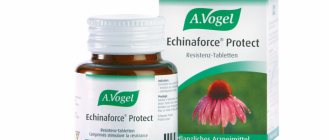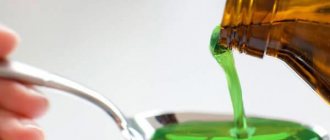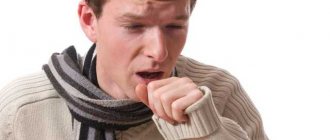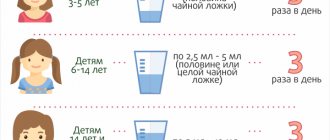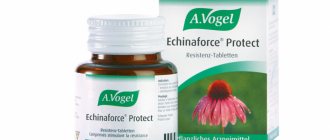Compound
100 g of the drug contains:
| Active components | |
| Plantain lanceolate extract (1: 1) | 5.00 g |
| Excipients | |
| Peppermint oil | 0.01 g |
| Sugar | 25.00 g |
| Beet sugar syrup | 50.00 g |
| Potassium sorbate | 0.15 g |
| Water | up to 100.00 g |
special instructions
100 ml of the drug contains 22.43 g of sucrose and 13.75 g of fructose. This should be taken into account by patients with diabetes and patients with intolerance to any sugar. Potassium sorbate contained in the drug is harmful for people on a low-calorie diet.
The drug should be used with caution in patients with hyperacid gastritis, gastric ulcers with high acidity, and reflux esophagitis.
During pregnancy and breastfeeding. The drug can be used during pregnancy and breastfeeding.
Children. Due to the peppermint oil content, this medicine should not be used in children under 2 years of age.
Impact on the ability to drive vehicles or other machinery. The drug does not have any effect on the ability to drive vehicles or operate machinery.
Release form
bottle, 100 ml
bottle, 250 ml
You can ask your question to the consultants about Dr. Cough Syrup. Theiss.
See also useful information:
- Inhalation for cough
- Mucoplant from Dr Theiss – heals without crippling
- Syrup Doctor Theiss - and no cough
- FAQ
Dr. Theiss recommends:
- Sage extract with vitamin C
- Rhinotaiss for runny nose
Natural ingredients Plantain
Mint
All drugs in the Cough Syrups section
Pharmacological properties
The main active ingredients of plantain are mucilages, iridoid glycosides (aucuban, catapol), phenolcarboxylic acids (chlorogenic acid) and their glycosides (verbascoside), saponins, flavonoids, tannins.
Thanks to these substances, lanceolate plantain has anti-inflammatory, secretolytic and antibacterial properties. thins mucus and promotes expectoration. Plantain lanceolata, increasing the phagocytotic activity of granulocytes and the synthesis of interferon, affects the body's immune system.
Aqueous extract of plantain lanceolata accelerates coagulation in vitro and in vivo. It was also mentioned that aqueous extract of plantain accelerates epithelial growth and scarring in wounds and reduces congestion.
Plantain extract reduces the toxicity of cytostatics. Aucubin has activity in protecting the liver from poisoning by carbon tetrachloride and α-amanitin (a poisonous mushroom).
Composition and release form
Compound
active ingredients: 100 ml of syrup contains: liquid plantain leaf extract (Plantago lanceolata) (1: 1) (extractant - ethanol 40%) - 5.0 g;
coltsfoot leaves extract liquid (Tussilago farfara) (1: 1) (extractant - ethanol 40%) - 5.0 g; mint oil - 0.01 g; eucalyptus oil (Eucalyptus oil) - 0.01 g; Excipients: honey, caramel (E 150d), brown cane sugar, potassium sorbate, purified water.
Release form
Syrup (100 ml in a dark glass bottle or in a dark plastic bottle; 1 bottle in a cardboard box).
Basic physical and chemical properties
Brown viscous liquid with a characteristic odor. Light opalescence is acceptable.
Cough syrup Doctor Theiss with plantain
Good afternoon to all my readers!
The season for colds and visits to doctors is open. Not long ago, the “Doctor Theiss” brand appeared on the market, which claims to be a medicine for children with natural ingredients. The active ingredient in this particular syrup is plantain, and because of it, the syrup has an expectorant and anti-inflammatory effect.
Price — 238.50 rubles
Volume – 100 ml
Shelf life - 3 years
Manufacturer - Germany
The drug "Doctor Theiss" (for cough) has antispasmodic, antibacterial, anti-inflammatory, and immunostimulating effects. It has pronounced mucolytic properties and helps facilitate the passage of mucus from the bronchi. It is effective against many microorganisms.
The product has a beneficial effect on inflammatory processes of the middle ear, normalizes digestion, stimulates gland secretion, and ensures regeneration of mucous membranes and skin.
The packaging is a little dangerous and flimsy in my opinion. Firstly, the bottle is made of thick glass, very heavy, and if it suddenly falls on someone’s leg, then a fracture may occur, or a bruise is definitely guaranteed. And secondly, the bottle does not close tightly, that is, after opening, it does not close completely and because of this it leaks a little.
The taste is for a very big fan, since the taste of plantain is so bright that the aftertaste remains for a long time. It is very difficult for a small child to drink this sickly sweet plantain liquid, since it is actually very sweet. It contains: honey, sugar syrup, beet sugar syrup, in my opinion, too much. There is also a minty taste that comes through, which somehow smoothes out this sweetness. So I advise you to drink this syrup with plenty of water.
COMPOUND
liquid extract of plantain lanceolate; mint oil; sugar syrup (dextrose, fructose, sucrose); honey; sugar beet syrup; potassium sorbate; water.
How to use. The child is 3.5 years old and she took half a teaspoon of syrup 3 times a day, usually after meals. The course lasted 5 days.
DOSAGE OF THE DRUG
For children from one year to 6 years old, the recommended dose is half a teaspoon or 2.5 ml every 3-4 hours (however, no more than 4 doses per day). Children over 6 years of age and adolescents can be given 1 teaspoon, which is 5 ml, every 2-3 hours (also no more than 4 times a day). For adults, the dose is increased to 1 tablespoon after 2-3 hours.
The result, or rather the lack thereof. The cough appeared on the fourth day after the onset of the illness (sore throat, fever, snot, cough, everything according to the standard pattern). The child coughed with a very dry cough, the sputum did not come out. The doctor prescribed him in four days for five days. During all this time there was no improvement at all, a dry cough, even the temperature sometimes rose to 37*0-37*5. In general, until the pediatrician prescribed Codelac Broncho, the cough never went away and the sputum did not go away.
Bottom line In our case, the syrup turned out to be completely useless, it didn’t do anything bad, but nothing good either. I think that syrups with natural ingredients are not suitable for everyone.
Pharmacodynamics and pharmacokinetics
The main components of plantain extract are: flavonoids , iridoid glycosides (catapol, aucubin), tannins , mucilage , saponins , phenolcarboxylic acids (chlorogenic) and their glycosides (verbascoside). It is due to their influence that the secretolytic, anti-inflammatory and expectorant (thinning sputum ) effectiveness of cough syrup with plantain is manifested.
Analogs
Level 4 ATC code matches: Cashnol
Anise oil
Bronchophyte
Pine buds
Pertussin
Bronchosan
Gedelix
Mixture for inhalation
Herbion ivy syrup
Herbion plantain syrup
Herbion primrose syrup
Mukaltin
Sinupret Forte
Bronchosept
Joset
Thermopsol
Tussamag
Marshmallow syrup
Dry cough syrup
Ammonia-anise drops
- Bronchicum;
- Gedelix;
- Althea;
- Bronchipret;
- Chest collection;
- Gerbion;
- Doctor Mom;
- Eucabalus;
- overslept;
- Licorice extract;
- Linkas;
- Stoptusin-Fito;
- Travisil , etc.
Note!
Description of the drug Cough syrup Dr. Taissa fl. 100ml on this page is a simplified author’s version of the apteka911 website, created on the basis of the instructions for use.
Before purchasing or using the drug, you should consult your doctor and read the manufacturer's original instructions (attached to each package of the drug). Information about the drug is provided for informational purposes only and should not be used as a guide to self-medication. Only a doctor can decide to prescribe the drug, as well as determine the dose and methods of its use.
Doctor Thaiss syrup with plantain
Dr. Theiss syrup with plantain is a herbal remedy that provides effective removal of bronchial secretions from the respiratory tract. It thins mucus (without increasing its volume) and facilitates its removal from the lungs. It is used as part of complex treatment for diseases of the respiratory tract of an inflammatory nature, accompanied by a cough with the release of thick, viscous, difficult-to-evacuate sputum. Peppermint oil, which is part of the drug as an auxiliary component, has a sedative and anti-inflammatory effect on the inner lining of the oral cavity and larynx. The syrup does not contain ethanol and has a minimal range of unwanted side reactions and contraindications, which allows its use in children and elderly patients. Take a small amount of liquid. Single dose: 1 tablespoon (adults), 1 teaspoon (patients from 6 to 18 years), ½ teaspoon (patients from 1 to 6 years). Frequency of application: every 2-3 hours (adults), every 2-3 hours, but no more than 4 times a day (patients from 6 to 18 years), every 3-4 hours, but no more than 4 times a day (patients from 1 to 6 years). Possible undesirable side reactions: skin rashes, a feeling of painful tickling irritation of the skin, causing the need to scratch the irritated area, urticaria. Do not apply if you are hypersensitive to any active or auxiliary component. Pregnancy and lactation are not contraindications to the use of the drug. In pediatric practice, it is used after the patient reaches one year of age. The drug contains sucrose as an auxiliary component, which should be kept in mind when treating people with diabetes, as well as on a low-calorie diet. The drug cannot be combined with centrally acting antitussive drugs, because the consequence of their combined use may be difficulty in the passage of liquefied bronchial secretions.
It is also not recommended to use the drug together with drugs that suppress the formation of tracheobronchial mucus. The drug does not require special storage conditions and retains its pharmacological activity and state of aggregation at room temperature. Plantain, which forms the basis of the drug, is the oldest medicinal plant. It was used 3000 years ago in Ancient China. The ancient Greeks and Romans harvested plantain to treat dysentery and inflammatory diseases of the digestive tract. In Avicenna's treatises this plant is mentioned as an effective remedy for healing wounds. The modern pharmaceutical industry uses plantain to produce a range of drugs, including Dr. Theiss syrup. This plant is still in demand in folk medicine. The biologically active substances contained in it suppress the growth of opportunistic and pathogenic microflora (staphylococci, streptococci, pseudomonas), have a calming and wound-healing effect, and are effective in diseases of the respiratory tract as a means of facilitating the passage of mucous secretions from the respiratory tract and lungs. Plantain has a hypotensive effect, it is used for inflammation of the bronchi and pleural layers, bronchial asthma, infections caused by Haemophilus pertussis, nosebleeds, inflammation of the urethra, ARVI, pulmonary tuberculosis, ulcerative-erosive lesions of the stomach and duodenum. The production factory of Dr. Peter Theiss has been in operation since 1978, and in 2007 a new production complex was built. The process of development and industrial production of new herbal medicines is personally controlled by the director. The effectiveness of drugs under the Doctor Theiss brand is determined by the originality of pharmaceutical technologies, a deep understanding of the fundamentals of pharmacognosy, and high-tech production.
pharmachologic effect
Combined preparation of plant origin; has an expectorant and anti-inflammatory effect.
Plantain has an expectorant, anti-inflammatory, analgesic, bacteriostatic and antiallergic effect.
Coltsfoot - has anti-inflammatory, emollient, mild diaphoretic and weak antispasmodic effects.
Eucalyptus oil has a stimulating effect on the receptors of the mucous membranes, has an anti-inflammatory and antiseptic effect.
